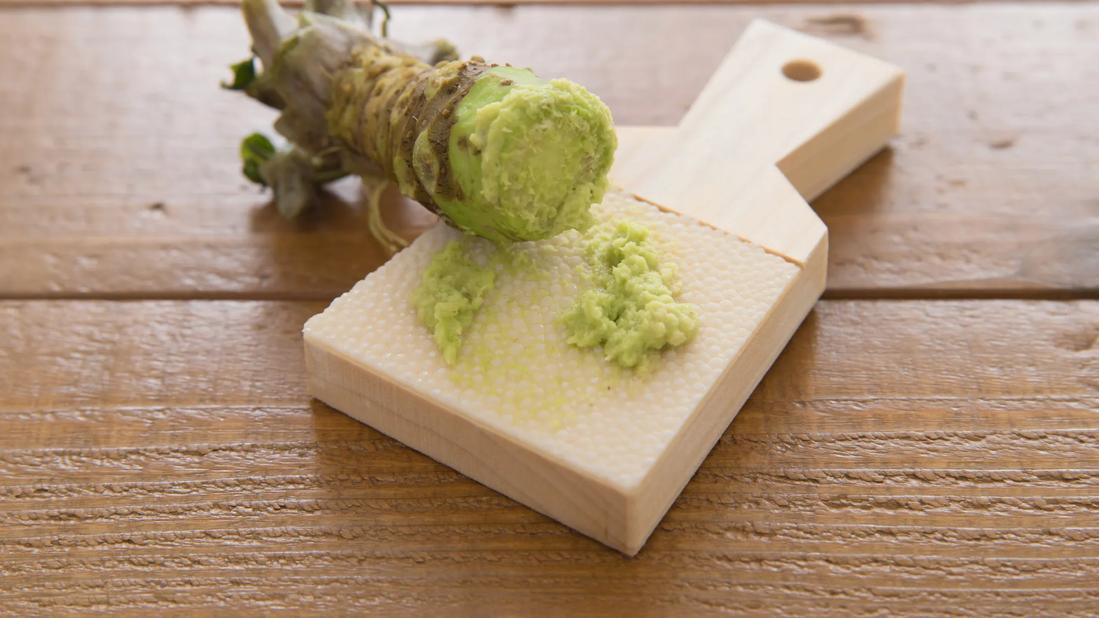Wasabi root may protect against cancer, food poisoning and memory loss

Image content: This image is available to view online.
View image online (https://assets.clevelandclinic.org/transform/0c76a291-3e1b-4407-8e31-fee892abe3f2/wasabi-911290852)
Wasabi root partially ground up on a mini cutting board
If you enjoy a pinch of wasabi with every bite of sushi, we have good and bad news. The good news: Wasabi can benefit your health. This green root has small amounts of nutrients, like vitamin C, calcium and potassium. Its antioxidants may help protect you against inflammation. And special compounds may help enhance memory and protect against cancer.
Advertisement
Cleveland Clinic is a non-profit academic medical center. Advertising on our site helps support our mission. We do not endorse non-Cleveland Clinic products or services. Policy
Now, the bad news: The bright green spicy goodness perched in the corner of your sushi box is not actually wasabi — it’s typically a blend of horseradish, mustard powder and green coloring. Real wasabi (Wasabia japonica), or “Japanese horseradish,” is hard to find in the United States.
Wasabi is a cruciferous (leafy) vegetable in the Brassicaceae family, which includes radishes, horseradish and mustard plants. It’s native to Japan and grows along streams and rivers there. But it can also be grown in shady and humid parts of Korea, China, New Zealand and North America — though it’s not an easy crop to grow.
“Wasabi is difficult to grow and has a short shelf life,” says registered dietitian Amber Sommer, RD, LD. “As a result, true wasabi is expensive and hard to find outside of Asia.”
To eat wasabi, the root of the plant is grated and then formed into a paste. It’s also sold as a powder.
When it comes to authentic wasabi, the usual nutrients aren’t the real stars of the show. While wasabi contains fiber and potassium, it only has small amounts of vitamins and minerals. The reason wasabi is good for you is because of compounds called isothiocyanates (ITCs), which have anti-inflammatory and antioxidant properties.
Advertisement
Potential health benefits of wasabi (and the ITCs it contains) include:
Wasabi’s ITCs and vitamin C can boost your immune system. But wasabi may also protect you from the two bacteria that most commonly cause food poisoning:
Research shows that wasabi, as an extract and powder, has antibacterial properties and can offer protection from foodborne pathogens. One ITC in particular — allyl isothiocyanate (AITC) — is largely responsible for these protective benefits.
“Wasabi may offer some protection to keep you from getting sick when it’s eaten with certain raw foods, like sushi,” says Sommer. “But the research is limited, so you should always still properly clean and prepare your food.”
A recent Japanese study focused on the effects of wasabi supplements on brain function. It showed that adults between ages 60 and 80 who took wasabi supplements had significant memory increases compared with participants who didn’t use supplements. These improvements included working (short-term) and episodic (long-term) memory performance.
“While the research didn’t show much improvement with executive function or focus, the results were very promising,” notes Sommer. “Wasabi may one day be part of an effective approach to treating age-related memory loss. But talk to your healthcare provider before starting any kind of supplement.”
Experts agree that eating cruciferous vegetables, including wasabi and horseradish, may decrease your risk of several types of cancer. But research shows that the ITCs in wasabi roots and leaves may have specific anti-cancer benefits.
A chemical called acrylamide (AA) can form in starchy foods cooked with high-temperature processes like frying or grilling. The U.S. Environmental Protection Agency (EPA) and some other organizations believe AA may be a human carcinogen — meaning it causes cancer.
“More research is needed, but so far, research suggests that the ITCs in wasabi may prevent formation and inhibit the effects of AA exposure in the body,” explains Sommer.
Both types are bright green and taste similar, but there are a few ways to tell the difference:
Bottom line? While real wasabi may be hard to find in the U.S., researchers are working to uncover its potential health benefits.
Advertisement
Advertisement

Sign up for our Health Essentials emails for expert guidance on nutrition, fitness, sleep, skin care and more.
Learn more about our editorial process.
Advertisement
Pick bell peppers to help fight cancer, memory decline and joint pain
The tropical fruit is a good source of antioxidants and vitamin C
High amounts of cholesterol and saturated fat in red meat may be linked to heart disease
The leaves and pods from this tree are rich in essential nutrients
This starchy root vegetable is a staple in many global cuisines — but it has to be prepared correctly, or it can cause serious concerns
These delicate green sprouts can give you an extra dose of vitamin K and other nutrients — but they’re not safe for everyone
Edamame, lentils and chicken breast are good sources of protein
Eating this root vegetable can help support your eye, heart and brain health
Prioritize your health by managing stress, strengthening your social connections and getting quality sleep
Bolsters, blankets, pillows and blocks can offer extra support, stability and comfort
Allergies, postnasal drip, asthma or reflux could be to blame for a cough that won’t quit